Fast-tracked for success
Food animal veterinarians are in short supply but CVM seeks to close the gap through longstanding VetFAST program
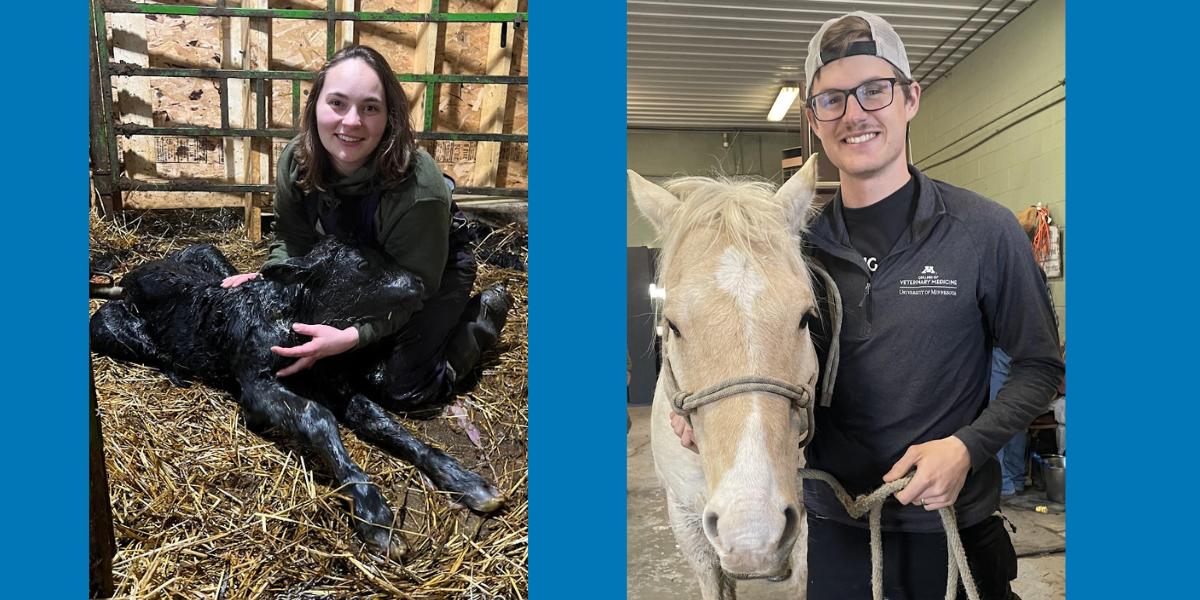
Food animal veterinarians are in short supply but CVM seeks to close the gap through longstanding VetFAST program
Madison Baumgartner (left) and Leyton Becker are two College of Veterinary Medicine students pursuing DVM degrees through the Veterinary Food Animal Scholars Track program.
All around the United States, veterinary care shortages have people waiting longer and driving farther to get care for their animals. Rural areas in particular have been hit hard by the shortage.
Demand for veterinary services continues to outpace demand but the University of Minnesota College of Veterinary Medicine (CVM) is working to help close the gap.
CVM students Madison Baumgartner and Leyton Becker are part of this work. Upon their graduation later this spring, Baumgartner and Becker will join a group of students who have completed a DVM through the school’s Veterinary Food Animal Scholars Track (VetFAST) program.
Designed to address the shortage of veterinary graduates entering food animal medicine, VetFAST gives high-ability undergraduates a path to completing their bachelor's and DVM degrees in seven years instead of the typical eight-year training. The program saves students time and money while offering access to top-quality mentors and connections in the food animal industry.
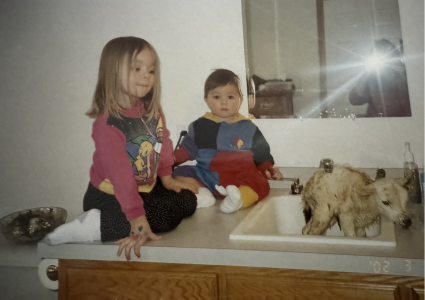
The VetFAST program, now marking its 20th year, welcomed its first class of students in 2004. Attracting more than 250 applicants since its inception, VetFAST has also produced 126 highly-qualified food animal veterinarians.
Baumgartner discovered the VetFAST program when researching universities to attend for undergraduate studies. Growing up in rural North Dakota on an Angus cattle farm, she kept a herd of goats, cared for bottle calves, and enjoyed the farm’s sheep, pigs, chickens, donkeys, and other species. Days on the farm sparked Baumgartner’s love of animals and desire to become a veterinarian.
“Because of my background, I already had a passion for food animal medicine,” she says. “The VetFAST opportunity just helped me continue to pursue my dreams. It was the perfect stepping stone to reach my goal of becoming a food animal veterinarian.”
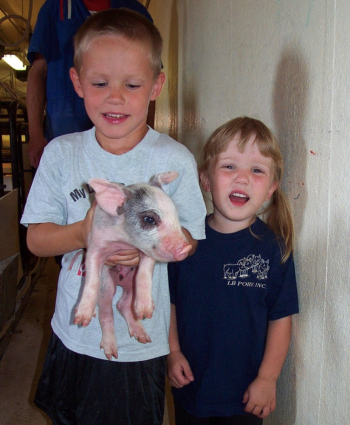
Coming from a similar background, Becker grew up on his family’s hog farm in Fairmont, Minn., He spent a lot of time around livestock through his work on the farm, showing pigs in 4H, and competing in Future Farmers of America livestock judging—even being named a young Minnesota State Pork Ambassador.
Becker felt inspired to combine his interest in farming and his love of animals by applying to veterinary school.
“Farming is the backbone of America, and if I can use my gifts and abilities to bring about positive change, now that gets me really excited,” he says.
Originally planning to pursue a DVM at another school, Becker discovered the VetFAST program. Sold on its many benefits, he moved the U of M to the top of his list.
Among those benefits are access to high-quality mentors and scholarships, hands-on clinical training opportunities within the food animal industry, and a shorter education track.
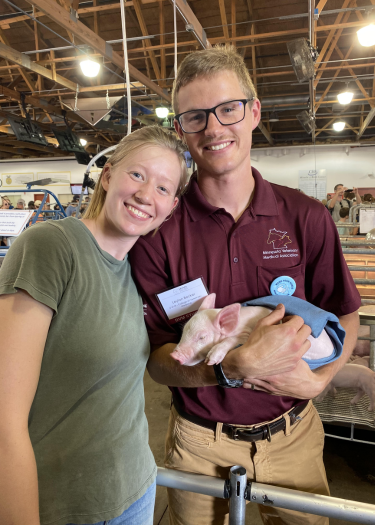
The impact of the program also extends beyond helping students. Consumers benefit from more food animal veterinarians entering the workforce. These veterinarians play a crucial role in keeping food animals healthy and food products derived from them safe. They monitor for infectious diseases in herds or flocks by testing and implementing measures to prevent disease spread or by vaccinating animals or birds to reduce risk. A lack of veterinarians in these vital roles leaves the food supply chain open to threats from disease and other concerns.
Being a food animal veterinarian may involve long hours, remote locations, a large amount of livestock to care for, and many other challenging factors. VetFAST-trained students better understand the job requirements and how to manage the responsibilities thanks to the valuable experience they gain in the program.
Both Baumgartner and Becker look forward to using their education and training to make a difference in the lives of farmers and the food animal industry.
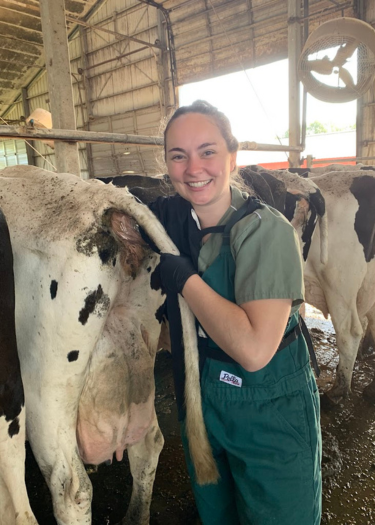
After graduation, Becker looks forward to working with swine, cows and calves, and feedlot cattle in Princeton, Minn.
“I strongly believe in advocating for my producers,” he says. “I know the blood sweat and tears that they put into their livelihood, and I hope to give them a helping hand in whatever way possible.”
Baumgartner will practice in a rural community in North Dakota. She eagerly awaits the opportunity to give back to a community that needs food animal veterinarians and is grateful to the VetFAST program for putting her on the path to this career.
“I recommend this program to any student interested in both veterinary medicine and food animal medicine,” she says. “It gives you not only a tremendous help financially, but it also truly helps you achieve your dreams.”
To learn more about the program, visit the VetFAST webpage.